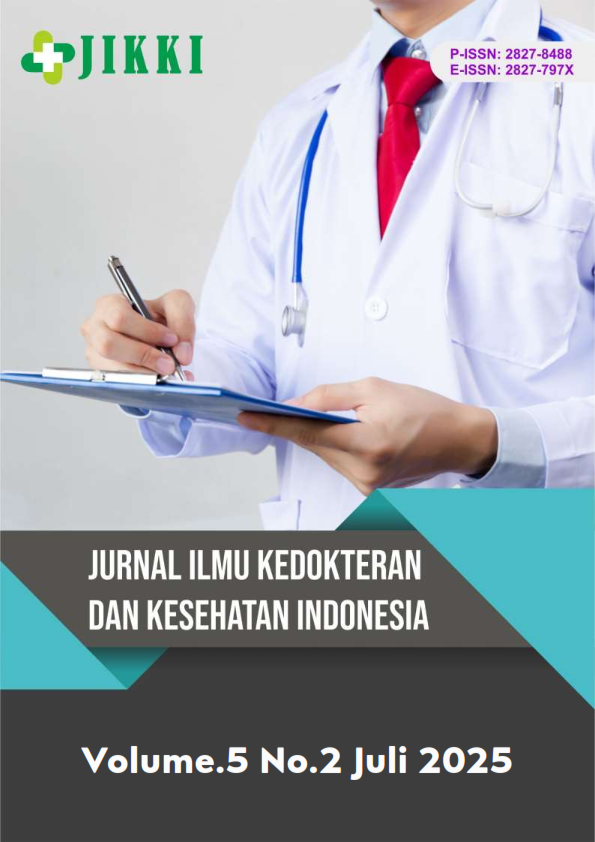Hubungan Tingkat Pengetahuan tentang PHBS dengan Perilaku Membuang Sampah pada Tempatnya di Siswa SMP Negeri 9 Seunuddon, Aceh Utara
DOI:
https://doi.org/10.55606/jikki.v5i2.5998Keywords:
Throw Away, Knowledge, RubbishAbstract
The aim of this research was to determine the relationship between the level of knowledge and the behavior of throwing away waste among students at MTS, N Seunuddon, North Aceh. The sample in this study was 18 grade 3 students with a quantitative research design with a cross sectional design. Instrument testing included Independent Variables which included Level of Knowledge and dependent variables including waste disposal behavior at MTS.N 9 Seunuddon North Aceh and statistical tests The type of sampling used in this research is total sampling. The research results showed that almost half of the respondents knew the results of calculating the respondent's knowledge before conducting counseling. Most of them had good knowledge with the number of respondents being 10 respondents (55.6%), and 8 respondents (44.4%) getting less good results out of a total of 18 respondents (100,%). It is known that the results of calculating the knowledge of respondents after being provided with educational counseling said that the level of knowledge was very good with the number of respondents being 17 (94.4%) and 1 respondent (5.6%) being less than good out of a total of 18 respondents. With the results of this research, it is hoped that school administrators, especially teachers, will provide health education or counseling about Clean and Healthy Living Behavior (PHBS), especially about knowledge and behavior of disposing of waste to their students.
References
Alexander, T. (2010). Lingkungan sekolah yang nyaman memacu siswa untuk berprestasi. http://un2kmu.wordpress.com
Armus, R., Mukrim, M. I., Makbul, R., Bachtiar, E., Tangio, J. S., Sitorus, E., Mahyati, M., Gala, S., Tanri, C. S., Fatma, F., & others. (2022). Pengelolaan sampah padat. Yayasan Kita Menulis. https://books.google.co.id/books?id=nSVZEA AAQBAJ
Carles. (2022). Pengelolaan sampah untuk mencegah penyakit diare. Penerbit NEM. https://books.google.co.id/books?id=VV1qEAAAQBAJ
Kementerian Kesehatan Republik Indonesia. (2018). Laporan nasional riset kesehatan dasar 2018. Jakarta: DepKes RI.
Nana Nurliana, C. A. (2013). Studi tingkat kesadaran siswa sekolah dasar dalam membuang sampah. Jurnal, Cimahi.
Notoatmodjo. (2003). Promosi kesehatan dan ilmu perilaku. Jakarta: PT. Rineka Cipta.
Notoatmodjo. (2007). Promosi kesehatan dan ilmu perilaku. Jakarta: PT. Rineka Cipta.
Notoatmodjo. (2011). Kesehatan masyarakat: Ilmu dan seni (Edisi revisi). Jakarta: PT. Rineka Cipta.
Pradana, I. (2012). Robo trash, solusi permasalahan malas buang sampah dalam ruangan. [Sumber daring tidak lengkap].
Riwidkdo, H. (2010). Statistik penelitian untuk penelitian kesehatan. Yogyakarta: Pustaka Rihama.
Sukismanto, Y. I. P. (2021). Buku saku panduan mengelola sampah di sekolah bagi warga sekolah. Penerbit Alinea. https://www.google.co.id/books/edition/Buku_Saku_Panduan_Mengelola_Sampah_di_Se/JctTEAAAQBAJ
Sumarno-Bapelkes Cikarang. (2012). Mengapa orang membuang sampah sembarangan? Cikarang.
Tarjo. (2021). Metode penelitian administrasi.
Widyastuti, Y., dkk. (n.d.). Kesehatan reproduksi. Yogyakarta: Fitramaya.
World Health Organization. (2017). Dampak lingkungan yang tercemar dalam perilaku PHBS.
Downloads
Published
How to Cite
Issue
Section
License
Copyright (c) 2025 Jurnal Ilmu Kedokteran dan Kesehatan Indonesia

This work is licensed under a Creative Commons Attribution-ShareAlike 4.0 International License.








